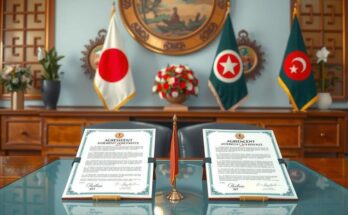The election of Donald Trump as President could lead to significant shifts in US policies toward Africa, favoring transactional diplomacy over multilateral engagements. This approach may threaten democratic norms and exacerbate current conflicts, especially as traditional peacekeeping efforts waned during his first term. The upcoming African Union meeting marks a critical juncture for African leaders to navigate these new geopolitical realities as they strive for stability amidst changing US foreign relations.
The election of Donald Trump as President of the United States marks a significant turn in American foreign policy, particularly concerning Africa. Trump’s inclination toward transactional diplomacy represents both opportunities and threats for the continent. Unlike the previous administration’s commitment to multilateralism and principles-based diplomacy, Trump favors direct negotiations, which may alienate African nations that value collective agreements and human rights considerations. The previous efforts to strengthen African peacekeeping initiatives under the Obama administration have diminished, leading to decreased US involvement in vital regional conflicts. The potential for renewed engagement under a hypothetical second Trump administration remains uncertain, with speculation surrounding his approach to Middle Eastern dynamics impacting African geopolitics. In his first term, Trump’s administration demonstrated minimal engagement regarding African security matters, often favoring the withdrawal of American troops from strategic areas. His administration was marked by controversial partnerships with autocratic leaders, reflecting an inclination to overlook democratic norms in favor of pragmatic alliances. As geopolitical tensions evolve, particularly with Russia’s growing influence in West Africa, Trump’s strategy will significantly affect the continent’s political landscape. The upcoming African Union (AU) meeting presents an opportunity for African leaders to engage with a future Trump administration, albeit under circumstances that may not be conducive to multilateral cooperation. Ultimately, while there are prospects for negotiation and new alliances, the overarching narrative suggests that liberal principles in foreign policy may wane under Trump’s potential return to power. The absence of a clear commitment to established norms raises concerns about future stability and peace in the region, presenting a precarious reality for African nations as they navigate the complexities of US foreign relations in the coming years.
The potential re-election of Donald Trump as President of the United States could reshape African relations significantly. His previous administration leaned towards a transactional approach rather than a multilateral one, focusing on direct negotiations with autocratic leaders and sidelining traditional diplomacy. The decline of US-supported peacekeeping missions in Africa reflects this shift—an evolution that contrasts with the more cooperative stance taken by the Obama administration regarding African Union efforts. These changes pose considerable risks to stability on the continent, particularly concerning ongoing conflicts.
In conclusion, if Donald Trump prevails in a second presidential term, Africa faces a challenging landscape characterized by transactional diplomacy rather than the cooperative principles that have guided prior US administrations. This shift may lead to unstable political dynamics, emphasizing the importance of strategic alliances while disregarding foundational democratic values. African leaders may need to adapt to a new reality in which peace negotiations are framed by the shifting allegiances reflective of Trump’s foreign policy priorities.
Original Source: www.bbc.com



